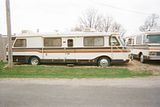Go to...  | Start A New Topic  | Search  | Notify  | Tools  | Reply To This Topic  |  |
 |
http://www.frantzoil.com/home.html Has anyone any experience with this? I have seen photos of it on an old Newell... _________________________ The 82 MCC {by Barth} is not an rv-- it is a Motor Coach!! | ||
|
| The Old Man and No Barth |
It's a toilet paper filter, & they have been around a long time. They must be bypass filters, not full-flow. A roll of toilet paper won't pass oil fast enough to to work with full-flow. The first oil filters applied to auto engines were bypass filters with a permanently mounted canister & a changeable filter element. There must be some good reason the industry long ago went to full-flow filters, aside from ease of use. A toilet paper filter wouldn't save much money in normal automotive use, & changing the innards periodically is more work, & messier than changing a modern spin-on filter. | |||
|
| First Month Member |
Any bypass filter is a good addition to a full flow filtration system, but Frantz is not the best one. The better ones use a uniform, very fine media, either paper, spun glass, or packed synthetic. The toilet paper allows the oil to form paths or channels through it, between the layers, so the filtration is not uniform. Additionally, there are variables, such as brand of TP, changing of formulation of TP within a brand, amount of paper stripped to fit, and technique of stuffing it in. Add the messiness and guesswork on frequency of change, and you have all the elements of a cult. Frantzers used to be a little cult of their own, and would often form multi-level marketing schemes to gain new members. If anyone wants to go with a bypass system, it can be done quite easily and economically using Balwin parts. Numbers on request. The Baldwin filter is a spin on, and the need for change can be detected by feeling the temperature up and down the filter. When a hot engine has a cold filter, it no longer has oil circulating through it. a more industrial approach would be to have a pair of gauges, measuring in and out pressure, or a delta P indicator. Our stationary engines had delta P popups. . 84 30T PeeThirty-Something, 502 powered | |||
|
 1/09 1/09 |
I have used them extensively over the years, and various derivatives of the Frantz (there have been and are many). The problem with the original Frantz filter today is that the toilet paper itself that we purchase at the store had changed appreciably since the Frantz came out in the late 1940's. Therefore the economy of changing out the element with what you get at the grocery store is not really possible today. As well the inner core size diameter has grown from the inception of the Frantz. So if you use one you need to buy their elements, and if your going to do that you can probably find better bypass filters. I am currently using the Amsoil, and though pricey, I'm convinced they do a fine job. There are the newer 'spinner' or centrifugal force filters that use engine oil pressure to effectively centrifuge a sidestream of oil, and they apparently do a very good job. As was mentioned above, changing the elements on the Frantz is a very messy job, I think cleaning out the centrifuge cup of the spinners is also a rubber glove affair. Most of the bypass filters really do remove the combustion by-products and water, they're kind of a mess to manage. I've always a good quality synthetic and calculated the bypass filters synergized the synthetic based oils good qualities. In the future I will look at the spinners, they seem to be getting much better industrial/fleet acceptance. 1990 Regency 32 Center Aisle Spartan Chassis CTA8.3 Cummins 240HP 4 spd Allison 7.5 Diesel Genset Pac-brake Prosine 2000 Mickey's on the Rear Toyos front | |||
|
| Powered by Social Strata |
| Please Wait. Your request is being processed... |
|
This website is dedicated to the Barth Custom Coach, their owners and those who admire this American made, quality crafted, motor coach.
We are committed to the history, preservation and restoration of the Barth Custom Coach.
We are committed to the history, preservation and restoration of the Barth Custom Coach.

